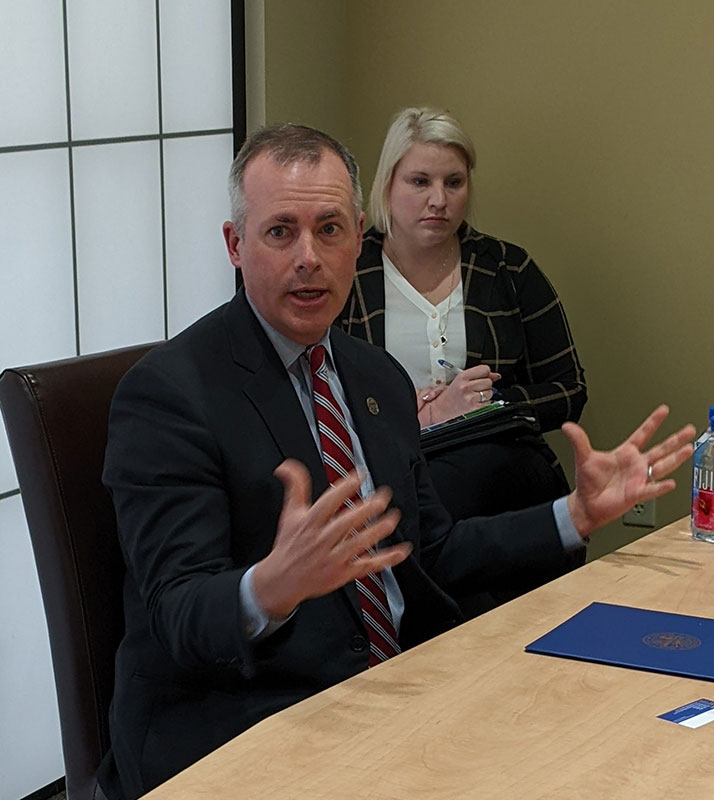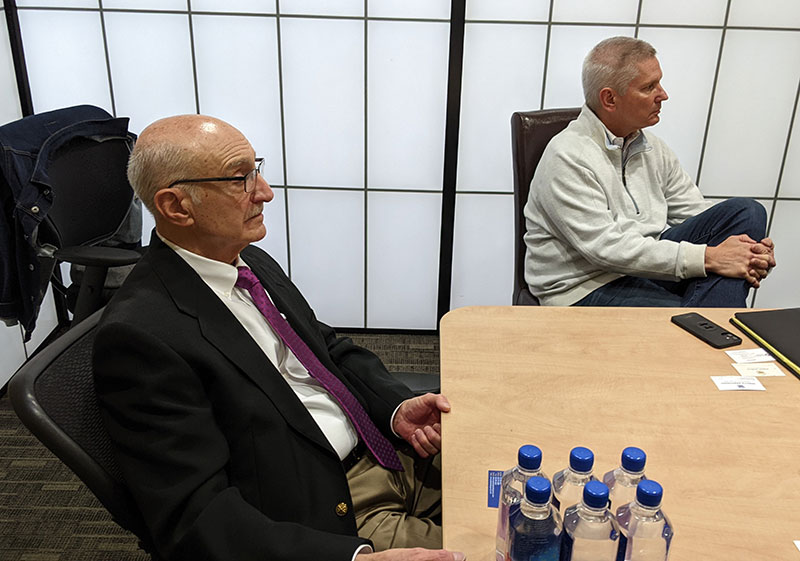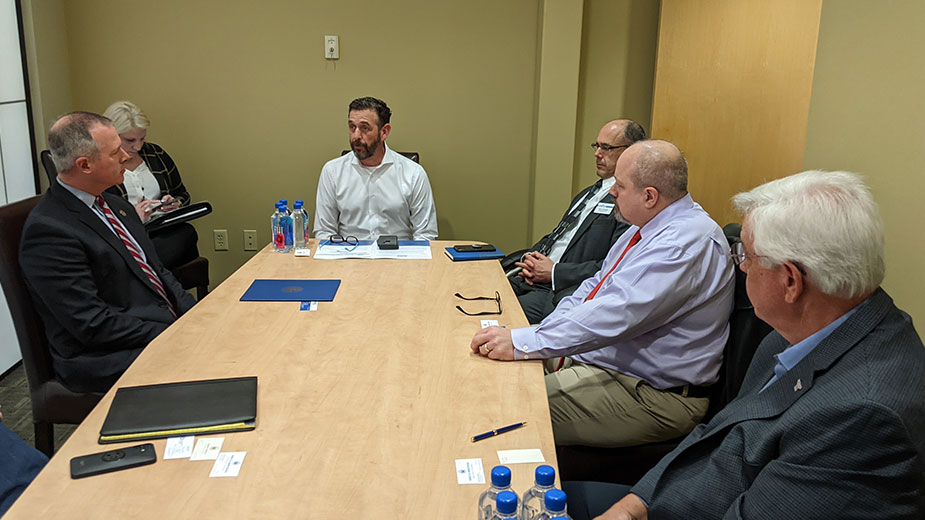Business Leaders Lament Inflation During Roundtable
BOARDMAN, Ohio – The one-two punch of increased costs due to inflation and a dwindling pool of job applicants is putting pressure on local businesses.
During a roundtable discussion Thursday conducted by Ohio Treasurer Robert Sprague, local leaders in the retail, transportation and commercial real estate sectors, as well as nonprofits addressed their chief concerns regarding inflation. For Joe Kerola, president and CEO of PI&I Motor Express Inc. in Masury, the combination of fuel costs and a need for workers is driving up his costs to transport goods to clients.
“We have a fuel surcharge that’s gone from the mid-20s to over 40% just added on the bill,” Kerola says. “Rates have also had to go up because it’s hard enough to find workers doing anything. Truck drivers become harder and harder to find.”
Kerola joined other panelists. They included state Sen. Michael Rulli, R-33; Chuck Zander, former owner of the Giant Eagle in Poland; Youngstown/Warren Regional Chamber President and CEO Guy Coviello; Don Thomas of Platz Realty Group; and Mike Iberis, executive director of Second Harvest Food Bank of the Mahoning Valley. The roundtable was held in a conference room at Rulli Bros. grocery store at 8025 South Ave.
On Thursday, the Associated Press reported an inflation gauge closely monitored by the Federal Reserve increased 6.4% last month compared to February 2021, marking the largest year-over-year rise since January 1982.
Consumer demand paired with shortages in goods have led to the sharpest price jumps in four decades, AP reported. Consumers increased their spending by just 0.2% in February, which is down from a 2.7% gain in January.

“Inflation hurts middle class and poor families the most as the cost of the things that they buy goes up,” said Sprague, the state treasurer. “And this inflation, I think, is absolutely backbreaking for a lot of working families across our state.”
Other factors affecting the trucking industry are higher prices on tires and product shortages, such as diesel emission fluid that trucks need to mitigate air pollution, Kerola said.
Wage increases also force employers to increase prices to offset the higher labor costs.
Thomas, who is a partner with a local restaurant, said he used to employ sous chefs at $14 an hour. “We just hired a sous chef for $25 an hour,” he said.
As rates increase, higher costs are passed onto the customer, Kerola said. End users that need shipments of wheat and lumber have to pay to have those products transported, provided trucks are available.
“It used to be critical that if you give me a load today or tomorrow, I could move it,” he said. “Now we’re even being told, ‘Well, if you can get it in the next week, that’d be great.’ Because there aren’t enough trucks. So this pricing pressure is going to continue.”
Kerola would like to see truck-driving schools and trucking companies get more assistance from the state to help fill the driver pipeline.
“I could probably hire 100 and not even know it,” he said. “We’re running a little over 400 right now.”
Offering some perspective, Rulli said his grocery is in the process of ordering a trailer of California olives, which will cost his company $23,000. In 2016, the same shipment would have cost about $9,200, he said.
“Just let that sink in. That’s more than double,” Rulli said. “This is the ugly truth about inflation. It’s not only hitting you at the gas pump or the supply chain.”
Inflation is also impacting Second Harvest’s ability to restock its inventory, Iberis said. At a time when the food bank is providing food to some 13,000 people weekly in Mahoning, Trumbull and Columbiana counties, Second Harvest has seen its inventory drop by about 35%, he said.
Iberis attributes that to the 40% increase in transportation costs, as well as not being able to secure the products.
“Even our wholesalers, we’re finding they’re short on product,” Iberis said. “We’ve had several loads that we’ve ordered six, seven weeks ago that they still have not been able to fill.”
Food banks throughout the Feeding America network in Ohio face the same situation, he said. Among his clientele, Iberis says senior citizens have increased the most in terms of need.
“They’ve seen this inflation absolutely ravage them because they’re on fixed incomes,” he said. “So they’re showing up more and more at a food bank and saying, ‘Hey, I’ve never been here before. And I’m coming here because I just can’t make it anymore.’ ”
Inflation is also negatively impacting economic development across the Mahoning Valley. Coviello said that in the last eight days, the Regional Chamber has been notified of about $800 million worth of projects that have been paused because of inflation.
“There’s probably more than that out there,” Coviello said.

Development is a key component for commercial real estate agencies like Platz, which is seeing a supply and demand issue because of the cost to build new, Thomas noted.
“The development piece for us has stalled because it costs so much to build something,” Thomas said. “The dollars per square foot to build a conventional warehouse – a 25,000 to 30,000-foot warehouse – used to be $100 to $125 a foot.
“It’s $200 a foot right now, and you can’t get somebody to commit to when they’re going to build it,” he said.
Bailouts “can’t be the solution” out of the current situation, Coviello said. Instead, he suggested policy solutions geared toward repopulating the state by promoting quality of life, which he said is a top priority for American companies and workers.
The chamber is working with the eight largest chambers of commerce in the state to put together a marketing plan to promote Ohio across the country, Coviello said.
“We’ve come to the realization that we’re not going to educate our way out of the workforce issue,” he said. “So we’ve concluded that marketing the quality of life in Ohio to the other 49 states is going to be a way to repopulate” the state with workers, he said.
Pictured at top: Attending Thursday’s roundtable where Ohio Treasurer Robert Sprague; Rebecca Armstrong, deputy director of public affairs for the Office of Ohio Treasurer; state Sen. Michael Rulli; Youngstown/Warren Regional Chamber President and CEO Guy Coviello; Chuck Zander, former owner of the Poland Giant Eagle; and Joe Kerola, president and CEO of PI&I Motor Express Inc.
Copyright 2024 The Business Journal, Youngstown, Ohio.



